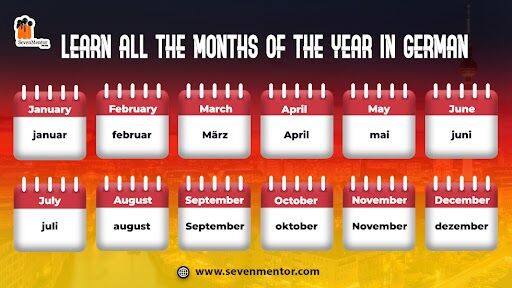Learn all the Months of the Year in German
In this blog, you will learn all the Months of the Year in German Language.
Januar (January)
You’ll likely already know how to pronounce the word “ja” (“yah”) in German. That’s exactly how you’ll start off saying this word in German to honor the Roman God Janus. Just add “nuar” (“nooh-ar”) following the “ja” (“yah”) and you’ve got your first month of the year perfectly pronounced.
Februar (February)
February, the month of purification, is named after the Roman Februalia. For this month, just keep in mind that this word starts with the sound “fee” and then adds the “uar” sound from above. Since German is a phonetic language, you’ll be relieved to hear that you can recycle plenty of sounds.
März (March)
You’ve likely encountered umlauts in German, but it’s really not as tricky as it might look at first glance. Just keep the pronunciation “mehrts” in mind, and you should be good to go. This month is dedicated to the Roman god Mars, by the way.
For Free, Demo classes Call: 02071171747
Registration Link: Click Here!
April (April)
The pronunciation of this spring month, literally aperire or “opening” in Latin, is what you call a “false friend”. In German, “A” is more likely to be pronounced like the American “ah” and the stress of the pronunciation is on the last part, “pril”.
Mai (May)
An easy way to remember the pronunciation of this month is by remembering the cocktail drink “Mai Thai”; it’s not clear what the Roman goddess Maia would have had to say about that. If you can remember to use this same pronunciation, you’ll be sounding like a true German in no time. Do read our Numbers in German blog.
Juni (June)
The month of June was named in honor of the Roman goddess Juno, wife of Jupiter. When you combine the letters “j” and “u” in German, you get a sound that is equal to the English word “you”. So if you can recall to pronounce it “you-nee”, you’ll once again be able to impress whoever you’re talking to about one of your favorite months and you will sound like a native.
Juli (July)
Juli is the month dedicated to Jupiter. As mentioned above, one of the convenient factors of a phonetic language is that rules don’t have a million exceptions. If you apply the Juni rule to pronounce this month, and just stick with “yoo-lee”, you’ll ace this pronunciation at your first shot at it.
For Free, Demo classes Call: 02071171747
Registration Link: German Language Classes in Pune!
August (August)
The only real difference between the two languages here is in the pronunciation. Just try saying “ow” a few times, making a round shape with your mouth, and then end it with “gust”. Put the two together and you’ll be just fine. Emperor Augustus would have certainly appreciated having a month named after him. Just like with April, the stress is on the second syllable.
September (September)
Again, recalling this month is straightforward. All you need to remember is that you will have to replace the hard “s” you’re used to in English with more of a soft “z” sound to transform this word into German. Done! Fun fact that you might want to use to impress your friends: this month actually was the seventh month at one point, hence the name September — septem means seven in Latin.
Oktober (October)
Following the same trend, octo simply means eight, and this used to be the eight month at one point. All you need to keep in mind here — aside from swapping out the “c” for a “k” as mentioned earlier, is that “Os” — in German sounds more like an English “uh”. So pronouncing the first of the “Os” in this word accordingly, will be your ticket to success, while the second “o” is long.
November (November)
You might have guessed this already, novem stands for nine, hence the name November. Just like its preceding month Oktober, the only significant difference in pronunciation here is the letter “o”. So again, just switch this over to “no-vehm-ber”, and you’ll never have to think about it twice.
Dezember (December)
And yes, you’d be correct in assuming that decem stands for ten in Latin. Once you’ve remembered to switch out the English “c” for “z”, just keep in mind that the first “e” in this word sounds more like “deh”. The best thing to do is to keep practicing these and you’ll have all 12 months down perfectly in no time at all.
Do watch our latest video on German Language Course in Pune
Author:
Siddhi Ghale
© Copyright 2021 | SevenMentor Pvt Ltd.
Call the Trainer and Book your free demo Class For German Language
Call now!!!
